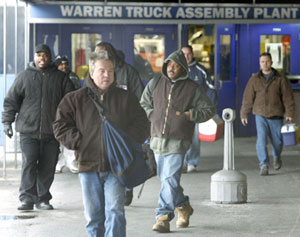|
‘Militant’ publishing schedule
The Militant will not publish next week. We will resume publication with the issue dated Jan. 19, 2009, which comes off the press January 8.
|
|
(lead article)
Auto bailout: huge cutbacks for workers

|
|
AP/Paul Sancya
|
|
Workers leave Chrysler truck assembly plant in Warren, Michigan, December 12.
|
BY BRIAN WILLIAMS
The White House announced December 19 it was bailing out General Motors and Chrysler with $17.4 billion in loans. The deal is premised on yet more steep concessions by auto workers to make these companies “more competitive.” If this is not accomplished by March 31, government officials say, the funds must be returned and the companies will have to file for bankruptcy.
The deal extends $13.4 billion in loans to General Motors and Chrysler in December and January, with another $4 billion in February. Ford is not seeking an immediate government loan.
“The automakers and unions must understand what is at stake,” stated President George Bush in announcing this decision. “The time to make the hard decisions to become viable is now—or the only option will be bankruptcy.” The move comes after both GM and Chrysler announced that they would run out of funds by the end of 2008.
Among the terms for the loan is that by the end of 2009 wages must be reduced and work rules made more “competitive” with those at the nonunion plants of Japanese car companies in the United States. Compensation or benefits will be halted for workers who have been fired, laid off, or furloughed.
At least half of company payments into the United Auto Workers (UAW) union health benefit fund will be made in stock shares. These pieces of paper normally become worthless when a company files for bankruptcy. In a little less than a year GM stock has declined 84 percent.
UAW president Ron Gettelfinger said he was disappointed that President Bush “added unfair conditions singling out workers” in the bailout, but emphasized that he was pleased the administration had taken “emergency action.”
“This will keep the doors of America’s factories open… . All stakeholders—management, directors, bondholders, suppliers, dealers, workers—will have to participate in shared sacrifices to help the industry move forward,” Gettelfinger said.
Meanwhile, both GM and Chrysler have assembled teams of bankruptcy lawyers to prepare for the option of an “orderly” bankruptcy. “One increasingly discussed option on Capitol Hill,” reported the Financial Times, “would be to provide federal aid in conjunction with bankruptcy protection, since commercial banks could be unlikely to lend to companies in Chapter 11.”
Auto giants slash production
A few days prior to the bailout, GM and Chrysler announced major cuts in production during the first quarter of 2009. GM said it was idling 30 percent of its North American manufacturing capacity during the first quarter, building 250,000 fewer cars and trucks. Some 20 GM plants will also be shut for about a month “in one of the broadest shutdowns in the automaker’s history,” noted the Times. GM officials said assembly lines at three of its Mexican factories are also being temporarily closed (see front-page article on Mexico).
Chrysler shut all 30 of its U.S. factories for at least one month beginning December 19, laying off 46,000 workers. Two factories in Toledo, one in Detroit, and one in Canada are projected to be down longer. Auto sales at Chrysler fell 47 percent in November, compared to the same month a year earlier. Overall auto sales in the United States were down 37 percent that month.
Ford is halting production at all but two of its plants for an extra week in January. Toyota and Honda have also announced production cuts. In Europe, where auto sales are down 26 percent, Volvo is halting work for 20 to 25 days in the first quarter of 2009. Spanish auto company Seat is also cutting production.
State and city cutbacks
As the contraction in capitalist production deepens, a growing number of state governments are slashing funds for social services vital to working people. Part of their scheme is reducing funds to cities, which in turn is leading to a new round of cuts by local authorities.
New York governor David Paterson’s latest budget includes cutting $240 million that has been going to New York City. He is proposing 137 new or increased taxes and fees, most of which would fall hardest on working people. This includes an 18 percent levy on non-diet soft drinks, doubling taxes on beer and wine, and increased taxes on gas, cable TV, cigars, and license and registration fees for owning and operating a car.
Paterson’s plan would also eliminate a 3 percent wage raise for state workers, increase retiree contributions for health-care coverage, raise the minimum retirement age for newly hired state workers from 55 to 62, and cut $700 million in education funds.
The state Metropolitan Transportation Authority voted December 17 to raise fares and tolls on New York bridges, buses, trains, and tunnels by an average of 23 percent. The cost of a single subway ride will increase to at least $2.50. This goes into effect in June unless the legislature approves a different plan.
Officials say the extra revenue is needed to keep current on interest payments to wealthy bondholders. “We had a fiduciary responsibility to pass it,” Executive Director Elliot Sander told Bloomberg News. “If we did not pass a board budget, our credit rating on the bonds that we put out to finance our programs would probably be downgraded rather rapidly and it would have a direct financial impact.”
Related articles:
Bosses lay off thousands of workers throughout Mexico
Capitalism’s long-term deflationary crisis
| 


